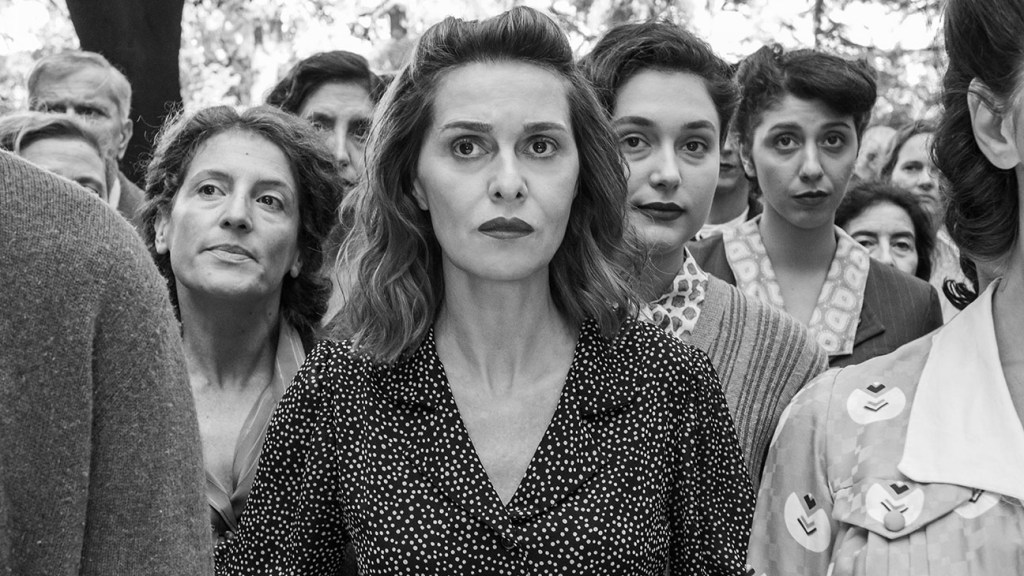After less than a month of negotiations, the Directors Guild and Hollywood’s top studios and streamers have reached a tentative agreement on a new three-year employment contract.
Details of the agreement between the union and the Alliance of Motion Picture and Television Producers (AMPTP) include increases in wages and benefits, streaming residuals, AI protections and more. (Full details are below.) Union leaders will have to explain to members in the coming days what they see as the merits and trade-offs in the treaty before members ultimately vote on ratification. The ratification vote is scheduled for Tuesday.
The new deal comes after DGA and AMPTP spent all day at the negotiating table on Saturday.
“We’ve struck a truly historic deal,” said Jon Avnet, chair of the DGA’s negotiating committee. “It offers significant improvements for every director, assistant director, production manager, assistant director and stage manager in our guild. In these negotiations, we’ve made progress on wages, streaming residuals, security, creative rights and diversity, while also securing essential protections for our members on key new issues such as artificial intelligence – to ensure DGA members are not replaced by technological advances . Without the unity of DGA members this deal would not have been possible and we are grateful for the strong support from union members across the industry.”
“This deal recognizes the global future of our industry and respects the unique and essential role of the directors and their teams as we move into that future,” said Lesli Linka Glatter, President of the DGA. “As every new technology brings great change, this deal ensures that each of DGA’s 19,000 members can share in the success we are all creating together. The unprecedented profits from this deal are a credit to the excellent work, tenacity and preparation of our negotiating committee. I am so proud of the phenomenal leadership and dedication of Negotiations Chair Jon Avnet, Co-Chairs Karen Gaviola and Todd Holland, as well as our Chief Negotiator, National Executive Director Russ Hollander, and our 80-plus member Negotiations Committee. I am also incredibly grateful to the DGA staff who have worked tirelessly over the past year and a half to achieve this outstanding deal.”
The DGA entered the negotiations on May 10 with an unusually serious tone. Aside from the fact that a writers’ strike broke out before their leaders entered the room, the working group had been warning its 19,000 members for months that this round of negotiations with the studios and streamers would be difficult, deviating from the usual practice of negotiating well before the contract expires hoping that this would give negotiators more clout. The union also appeared to be preparing to quickly mobilize its members by setting up an “outreach team” to handle internal communications and unit building.
“Every member of our union can be proud of the achievements we have made in all areas,” said Russell Hollander, DGA national executive. “Significantly, and for the first time ever, global SVOD residuals are paid based on the number of international subscribers. The result is a 76% increase in foreign backlogs for the largest services. As our industry becomes more global, these increases are essential to ensure our members are valued and rewarded for the incredible work they do.”
One of DGA’s key pushes in these talks was the introduction of a streaming residual value that reflects the growth of streaming platforms around the world. The union argued that its Streaming Video On Demand (SVOD) balance is based primarily on the number of platform subscribers in North America, while the number of worldwide subscribers counts less as employers pay a fraction of the domestic balance rate to offset them.
The union also wanted to improve data transparency for studios and streamers, codify new safety and diversity, equity and inclusion measures, protect the union’s health and pension plan, raise wage floors and support contractual creative rights for members.
Should DGA make significant strides in areas like streaming residuals and/or data transparency, their deal could have a minor impact on the ongoing writers’ strike. The Writers Guild of America went on strike May 2 after that union and the AMPTP failed to reach agreement on a range of issues, including residuals and data transparency. A DGA deal could provide the WGA with a template for compromise on these specific issues. Still, the latter union has mostly proposals on the table (including many of its key demands) that do not overlap with DGA’s demands, and it remains unlikely that DGA advances on residuals and data transparency would change the game for authors.
In a letter to members on June 1, the WGA reiterated its position that the AMPTP “needs to negotiate with the WGA on our entire agenda” regardless of whether any of the other unions – ie the DGA – agree to a new contract.
On Wednesday, May 31, as directors began their final week of negotiations, a coalition of unions including the WGA, SAG-AFTRA, IATSE and the Teamsters issued a statement saying they are “standing with our sisters, brothers and relatives”. DGA in their quest for a fair deal.” The group added, “As eyes around the world return to the negotiating table, we send a clear message to the AMPTP: our solidarity should not be underestimated.” Guild and unions stand united and we are strong.”
DGA national executive Russell Hollander led the talks for the union, while AMPTP President Carol Lombardini led the talks for studios and streamers.
Here are the details of the new contract:
· Wages and Benefits: Breakthrough increases in wages and benefits, including a 5% increase in the first year of the contract, 4% in the second year and 3.5% in the third year. An additional 0.5% to finance a new parental allowance.
· Global Streaming Residuals: Significant increase in residuals for dramatic programs created for SVOD by securing a new residual structure to pay for foreign residuals. The result is a 76 percent increase in foreign residuals for the largest platforms, such that residuals for an hour-long episode over the first three years of issuance will now be approximately $90,000.
· Artificial Intelligence: Groundbreaking agreement affirming that AI is not a person and that generative AI cannot replace the duties performed by members.
· Non-Dramatic Programs: Introducing the industry’s first Terms and Conditions for directors and their teams for non-dramatic programs (variety and reality) created for SVOD. Improved residuals and for the first time, assistant directors and stage managers are now included in the residuals.
High Budget AVOD Terms and Conditions. Achieved industry-first terms, creative rights protections, working conditions, and residuals for dramatic screenwriting projects made available for free to consumer streaming services such as Freevee, Tubi, and Roku. The production managers and deputy directors will participate in the remaining stocks.
Feature film directors: Historic initial pay for the “gentle preparation” months. Feature film directors currently perform free of charge prior to the start of the director’s official prep period.
· Episodic Directors: For pay-TV and SVOD, Episodic Directors received expanded paid creative rights for post-production; and received an additional guaranteed day of filming for one-hour programs – the first additional day in more than 40 years.
· Working Time Reduction: An unprecedented one-hour reduction in the Deputy Director’s working hours.
Safety: Delivered tangible safety advances, including the first-ever pilot program requiring the employment of dedicated safety officers; expanded safety training programs for directors and their teams, and a ban on live ammunition on set.













